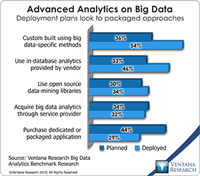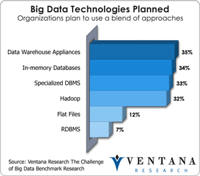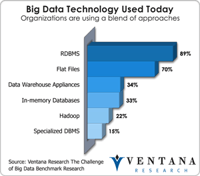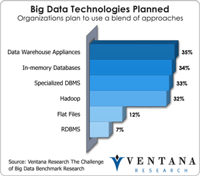At its annual industry analyst summit last month and in a more recent announcement of enterprise support for parallelizing the R language on its Aster Discovery Platform, Teradata showed that it is adapting to changes in database and analytics technologies. The presentations at the conference revealed a unified approach to data architectures and value propositions in a variety of uses including the Internet of Things, digital marketing and ETL offloading. In particular, the company provided...
Read More
Topics:
Big Data,
Teradata,
IT Performance,
Operational Performance,
Business Analytics,
Business Intelligence,
Business Performance,
Customer & Contact Center,
Information Applications,
Information Management,
Internet of Things,
Operational Intelligence,
Teradata Aster
Teradata recently gave me a technology update and a peek into the future of its portfolio for big data, information management and business analytics at its annual technology influencer summit. The company continues to innovate and build upon its Teradata 14 releases and its new processing technology. Since my last analysis of Teradata’s big data strategy, it has embraced technologies like Hadoop with its Teradata Aster Appliance, which won our 2012 Technology Innovation Award in Big Data....
Read More
Topics:
Big Data,
MicroStrategy,
SAS,
Tableau,
Teradata,
Customer Excellence,
Operational Performance,
Analytics,
Business Analytics,
Business Intelligence,
CIO,
Cloud Computing,
Customer & Contact Center,
In-Memory Computing,
Information Applications,
Information Management,
Location Intelligence,
Operational Intelligence,
CMO,
Discovery,
Intelligent Memory,
Teradata Aster,
Strata+Hadoop
Unlike other recent conferences that seem to focus almost exclusively on cloud computing, this week’s Teradata Partners Conference emphasized big data and analytics. The vision that Teradata lays out is one in which new technologies such as Apache Hadoop live side by side with more traditional enterprise data warehouses (EDW) and companies have the flexibility to define their own approaches to BI tools. This approach, at least in the near and medium terms, makes a lot of sense, and is backed by
Read More
Topics:
Big Data,
IT Performance,
Operational Performance,
Analytics,
Business Analytics,
Business Intelligence,
Business Performance,
Customer & Contact Center,
Information Applications,
Information Management,
Operational Intelligence,
Teradata Aster
Hadoop, the big-data technology, has transformed businesses’ ability to cost-effectively store and process large volumes of data for analysis. Numerous companies have invested in supporting Hadoop, and some produce commercial versions of the open source technology. At last year’s Hadoop Summit Hortonworks had just started to establish itself as one of these providers. Now, at the 2012 Hadoop Summit, with a new CEO, Rob Bearden, a new head of marketing, John Kreisa, and other hires, it is moving...
Read More
Topics:
Big Data,
Datameer,
IT Performance,
Analytics,
Business Analytics,
Business Intelligence,
Hortonworks,
Information Applications,
Teradata Aster,
Strata+Hadoop












